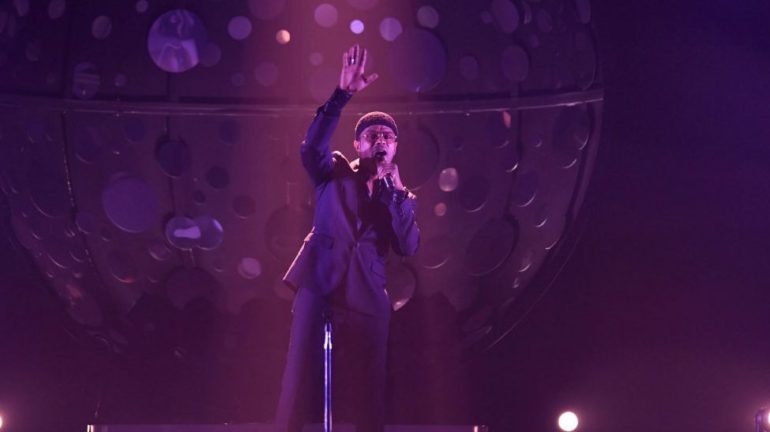Concert Review: Maxwell Brings Down the House at Rapturous Hometown Show
By Jem Aswad
LOS ANGELES (Variety.com) – Maxwell is usually a happy and gracious performer. But he was downright giddy at New York’s Beacon Theatre on Sunday night: The gig was not only the finale of his “50 Intimate Nights” tour , which started in September, it was the first hometown show he played on the entire trek.
Rarely was he not smiling: He thanked the audience multiple times for coming out on an unusually cold Sunday night, for supporting him for the 20-odd years since his debut “Urban Hang Suite” was released; he thanked people who supported his polarizing, recently re-released follow-up, “Embrya,” which has since been recognized as the bold and stereotype-smashing album it is. He gave shout-outs to nearly every New York City borough and a couple of neighborhoods; to his Haitian fans, his Puerto Rican fans, people on dates, people who are single. He recalled his days as a busboy at a nearby restaurant and talked about how he’d never have dreamed then that he’d be here now. He improvised a semi-autobiographical song onstage about how far he’s come — from his Brooklyn neighborhood on the J-train subway line — and how grateful he is. At the end of the show he handed the mic to each bandmember — as well as and tour opener Marsha Ambrosius, who came out holding her toddler daughter — and let them thank the audience (naturally, they all thanked him as well). He laughed and danced and shook hands with audience members from the stage multiple times. The crowd — swaying, singing, recording nearly his every move on their phones — ate it up. It was that kind of show.
is a rarity in the music industry: An old-school soul singer who led the mid-1990s neo-soul revival but has kept superstardom at arm’s length, and yet somehow has managed to retain a large, wide-ranging and deeply devoted fan base. He tours regularly but releases music in his own style (see “Embrya”) and at his own pace — eight years passed between his third and fourth albums. He’s the rare performer who draws fans who grew up on — and, as he puts it, “made babies” to — his music, yet he’s also a fully contemporary artist whose music remains forward-looking, and whose new albums are hotly anticipated by fans (which certainly isn’t true for many artists of his vintage).
And with the wave of innovative R&B singers that have arisen in recent years, his sound arguably is more relevant and popular than ever. The New York Times recently noted how anomalous his music was at the time of its release, yet “not long after Maxwell returned from a seven-year hiatus, he found himself surrounded by artists who took his influence and ran with it, like Miguel, Frank Ocean and Daniel Caesar. Now, Maxwell’s sound seems ubiquitous.” In a pair of retrospective reviews, Pitchfork recently gave his first two albums, “Urban Hang Suite” and “Embrya,” stellar ratings of 9.0 and 8.3 .
Accompanied by a six-piece band, Maxwell performed on a sleek white stage with a big sphere at the top, which served as a backdrop for video projections on one side (at one point it kind of resembled the Death Star), and was open on the other, with circular mirrors inside; for the encore, Maxwell emerged sitting inside with a glass of wine in his hand. He ran through songs from all eras of his career, from the crowd-pleasing “Urban Hang Suite” soul jams like “Til the Cops Come Knockin’” and set-closing “Ascension (Don’t Ever Wonder)” to his most recent single, “Shame,” from the forthcoming third album of his “BlackSummersNight” trilogy.
Even after 50 shows he was in strong voice, sustaining long notes, although he did tend to stay away from his higher register — he skipped his popular cover of Kate Bush’s “This Woman’s Work,” which is sung entirely in falsetto. While the audience called out for it, few were really disappointed: The audience danced and swayed and sang and screamed throughout the show, even though the median age was probably late 30s-early 40s.
“We’re gonna have a whole lot of new music coming next year, but I wanted to do these special shows to thank y’all,” he said toward the end of the set. And yet, after the long thank you’s that followed the encore of “Whenever Wherever Whatever,” he still wasn’t done.
Immediately after the show a lucky few dozen people gathered at the Soho House in the Meatpacking District for a tour-closing afterparty. Maxwell apparently was as eager to get to the party as anyone: We arrived at the space around 30 minutes after he’d left the stage, and he came in right behind us — freshly showered and in a new outfit, hugging nearly everyone in sight. While those of us who had to cover the morning news beat left at around 1 a.m., Maxwell was still holding court, presumably well into the wee hours, as people laughed and drank and danced as old-school R&B played.

